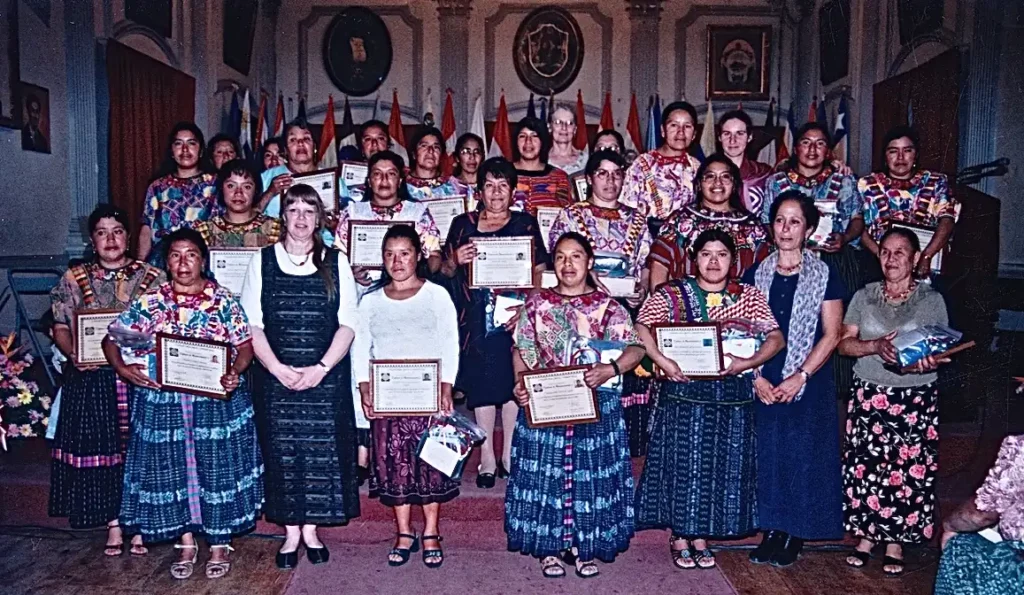MFM’s Story
Disclaimer
Midwives for Midwives is no longer an active organization. This website serves as a historical reference and archive of the organization’s past initiatives, advocacy, and community contributions. While the information provided reflects the work of Midwives for Midwives during its active years, the organization is no longer operational.
The Ixmucané Birth and Women’s Health Center opened in 1997 in Antigua, a historic and beautiful town near Guatemala City and one of UNESCO’s cultural world heritage sites.
Founded by Jenna Houston (a certified nurse midwife from the US), the center was named in honor of Ixmucané, (“Ish…moo…kanay”) described in the primary Mayan text Popol Vuh as the grandmother of all Mayans and the entire human race. She was the feminine goddess, the protector of women, and the vessel maker (Goetz, Morley, & Recinos, 1950).
Ixmucané was the midwife for all midwives.
The Ixmucané Birth and Women’s Health Center (Centro de Partos y Salud de la Mujer Ixmucané) opened in a large old hacienda in the center of Antigua.
A year after Ixmucané opened, they began making connections with the local traditional midwives and were eager to learn more about indigenous birthing practices and midwifery in Guatemala. They soon discovered that the local midwives were required to attend monthly meetings facilitated by a government-trained nurse. What happened at one of those meetings forever changed the direction of this work.
About 40 traditional midwives came to the meeting from the small towns and remote areas in the Department of Sacatepéquez, dressed in traditional woven traje (skirts and woven blouses with sashes). Most wore shoes, some were barefoot, some had children in tow.

While seated in a circle, the midwives spoke in turns, shared their stories and problems, asked questions, and voiced their concerns. Although many spoke from the heart, the nurse seemed dismissive of their comments. One comadrona (midwife) stood to speak. She began quietly and carefully, as if finding it difficult to share what she had to say. Looking downward, she told this story:
“I attended a birth two months ago and the mother died. I see the family every day and am so sad. The husband cried at the birth, and the children are now all motherless. I too cry and go to church every day. On my knees, I ask God for forgiveness. I know it was God’s will, but maybe I did something wrong. I can’t work anymore, because they took my carnet (license) away, and I feel guilty and very, very sad. I want to know what happened and what I could have done.” (Antonia Son Buk, 1998) All the midwives sat in silence for a moment. The nurse facilitating the meeting then said, “Alright, next…..”
The loss and pain in the traditional midwife’s story was shocking. The tender and personal plea for assistance was ignored, and the enormous anguish and courage of this midwife to share her story with the group was dismissed. At the meeting’s end, Ixmucané offered to start a midwifery support group and invited the midwives to come to a meeting at the birth center. The next day, 19 midwives arrived at the doorstep of Ixmucané. They were impressed by their eagerness to learn and connect. During that very first meeting, they suggested the idea of a support group of midwives, “by midwives and for midwives.”
Soon thereafter, Midwives for Midwives became a non profit and Ixmucané Women’s Health and Birth Center became a clinical practice site for midwifery students from other countries, and a place where traditional midwives could bring clients from their communities for consultation and care.
Ixmucané Women’s Health and Birth Center became the living representation for the merging of indigenous knowledge and evidence based best practices.

